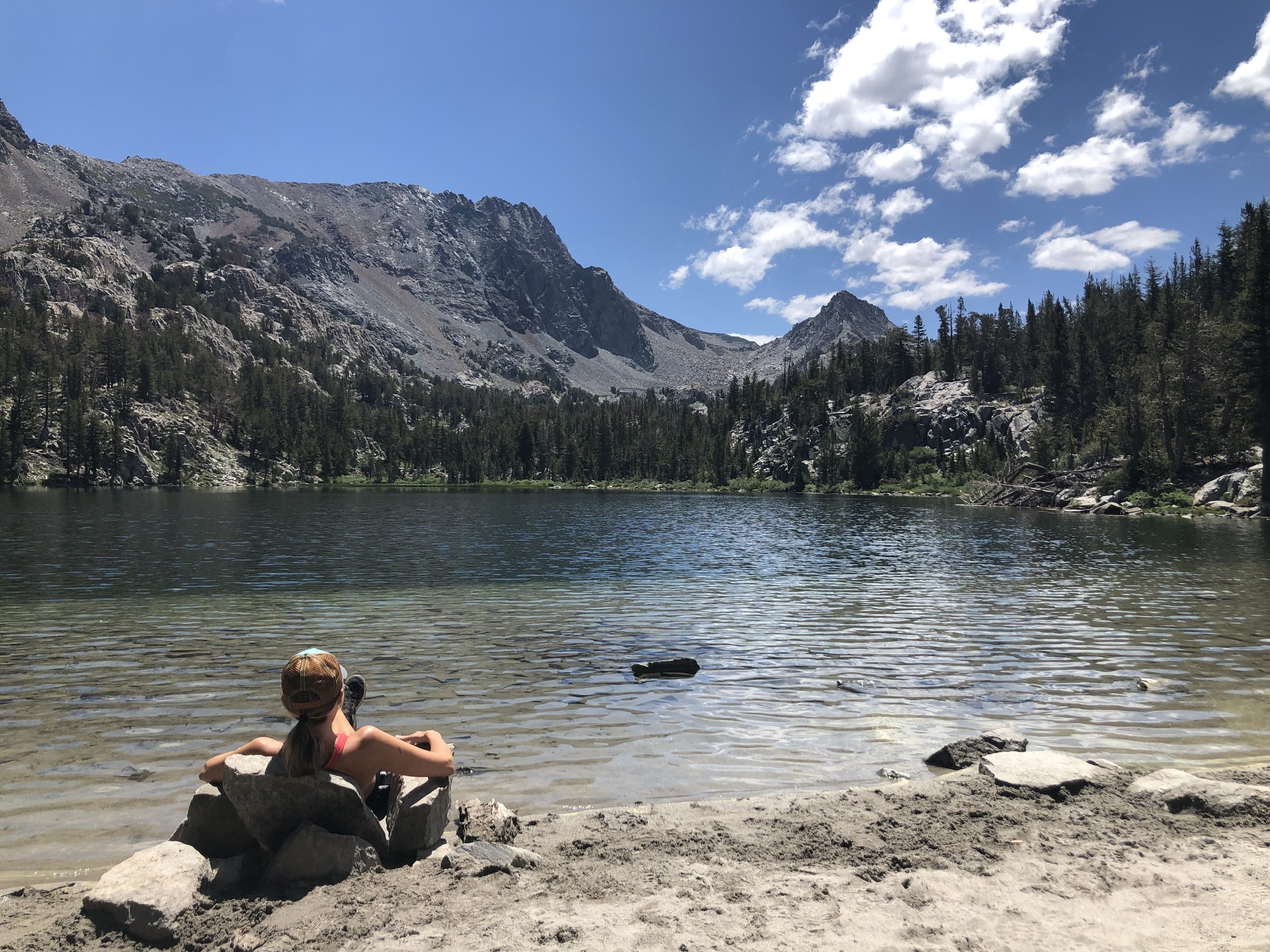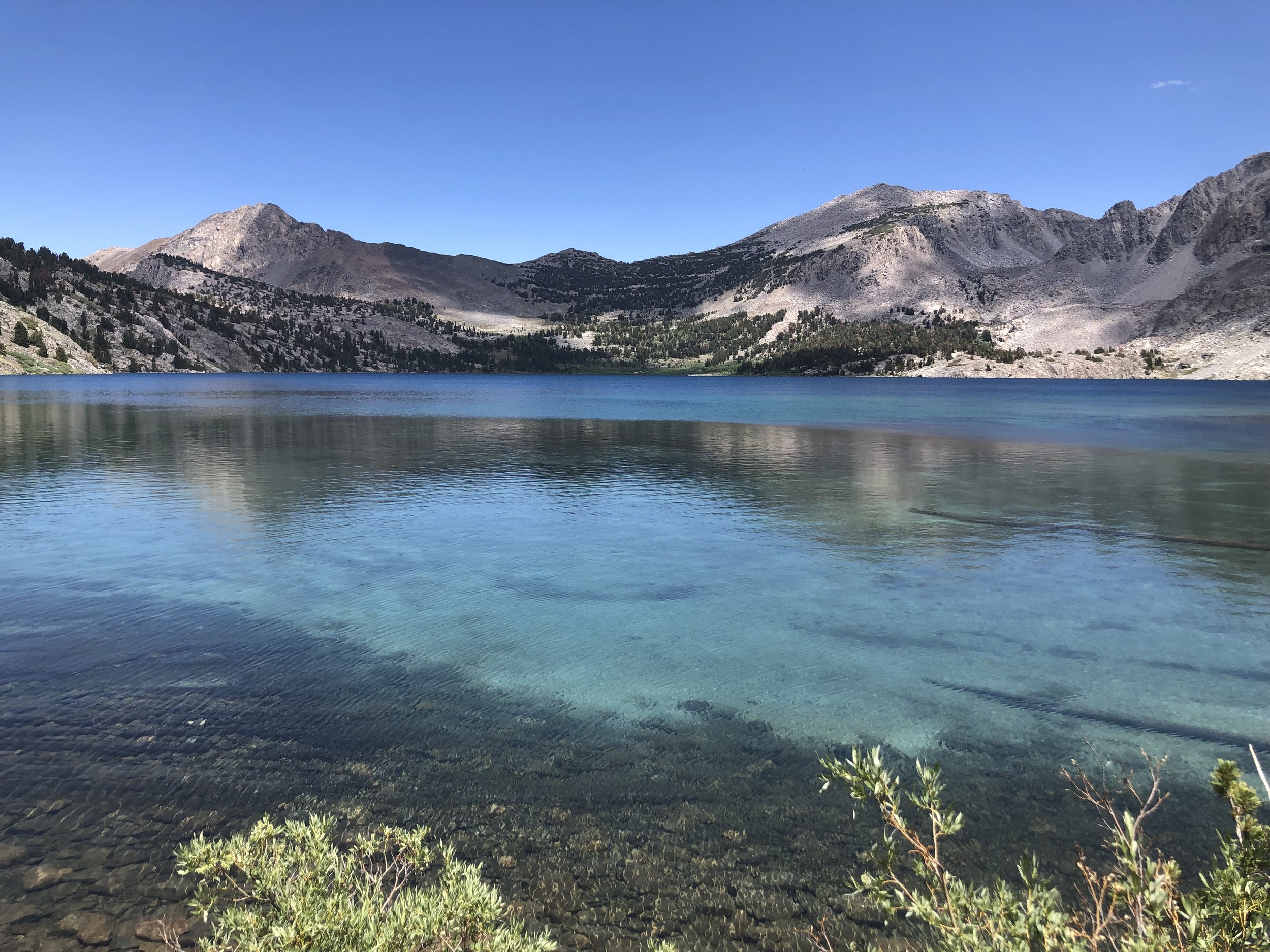I hike a lot. I love to roam in nature. This is my happy place, my haven, and my heaven. Typically in a month I am hiking anywhere from 20 miles up to 40 miles. Each hike I take, I aim for 10 miles and have begun pushing it up to 12 miles recently. Camping on the trail is not my thing. I would rather leave the trail as untouched by me as possible. I have hiked in all weather and all terrain from rain forests to snow topped mountains. Please, before you hike, take these measures so that you or your loved one’s don’t end up hurt or worse.
Me on a trail in Mammoth
There’s been a lot of tragedies on the trail. Just today, a young woman was found on Mt. Baldy. There’s ways to prevent these deaths, and as an avid hiker, I witness a lot of people on the trails that need assistance. One of my last hikes, firemen were called to rescue an elderly woman who I had passed earlier. The couple that was with this woman and her son (the son stayed with his mother) were struggling to make it back to the parking lot. I had my camelback with me, sunscreen, and my hat, but they had a single water bottle and were clearly overheating. They both admitted that they were underprepared and not in shape to be hiking that far. I have seen people fight in the parking lot after completing a hike because the person taking them on the hike did not prepare them enough and they were upset having been put in a dangerous situation. I have also gone hiking and relied on the other person to guide me and keep me safe, but did not feel safe at all.
What should you do if you want to go on a hike?
Talk to your doctor and make sure you are up for the challenge. Adjust the type of hike dependent on your needs. Switch things up if you need to. How? Keep your distance shorter. There is nothing wrong with going out on a short stroll on the trail. You can also select trails that are more accessible with more foot traffic. Review the terrain and inclines before you head out on a hike. One of my hikes that I love the most has a steep incline down at the beginning so you have to hike up on your way out and it can be extremely difficult especially when it’s hot out. Choose trails that are flat and shorten your distance.
Know your body and your limits. I went hiking with a friend and she and I hiked an intense switchback. Unfortunately her hands began to swell and shake from the exertion so we stopped and rested until she recovered. I have had to turn myself around many times and head back when my body was not up for the challenge. It is okay to stop. It is okay to turn around. I read a story about a seasoned hiker that went out before a snow storm and he died on the trail. His mother said he would have pushed himself and not turned back because he was the type that would push through the storm. Don’t. It cost him his life. Another man died in Death Valley even after rangers urged him to stop because he had something to prove. You don’t have anything to prove because the cost of this competition is your life.
Know the weather before you go out. Check the weather well before you hike and then right before you go on the trail. The heat can kill. Snowstorms can kill. Rainstorms can wash hikers away. This is not a battle between you and the elements. This is the time for us to be in harmony and not fight nature, but honor nature and its power. We are fragile and the weather does affect us and our performance. If it’s over 90 degrees out, don’t go on the trail. I won’t hike past 85 degrees because it takes a toll. I have and it was rough and I don’t recommend it. I have hiked in the snow and rain. Now, the rain I was fine because it was light and I was in a forest so it did not rain hard but you have to be prepared for it to possibly rain out if there are clouds out. You need the right gear in these situations (claws for the snow, poles for the snow and rain, and proper clothing). If you do not have the right gear for the weather, don’t go out on the trail. The extremes will kill. A snowstorm and extreme heat are the major killers of hikers. If the weather looks questionable, don’t go out on the trail. I’ve hiked the snow and excessive heat and I know the beauty but also the danger, and I learned my lesson. I was lucky. Avoid the snowy trails and the heat. If you do hit the snowy trails, make sure it is a clear day without the chance of storms and you have hiking claws, poles, a complete change of clothes, food, water, and mylar blankets. Don’t go out in the heat, there’s nothing positive about hiking in over 90 degrees other than damaging your body.
BRING A MAP!!! No one ever has a map, and when I say this, I mean I have had to guide people back every time I am on the trail. No one is researching the trails before they use them, and that could be deadly. Research the trail before you go. You can look for information on Alltrails.com, Google search the trail, or look up the trail information through the preserves website or forestry service. I read them all. I save the map on my phone. I’d advise printing it out just in case your phone dies. I also use an exercise app that records my path and pace so if I ever get lost, I can retrace my steps.
Your one little water bottle isn’t going to cut it. If you plan on going the distance, you are going to need water. Bring a backpack with multiple water bottles, sunscreen, and first aid. Unless you are going on a short hike, less than 3 miles, you will need more water. I love my camelback and have never drained it entirely on a hike, but I also conserve my water just in case.
Send someone your location. Not just your start location, but send someone your intended trail, too. Give them an estimated time you should be back in service so they know if you are not back, they need to send rescuers for you.
Watch your start time. Don’t ever begin a hike close to sundown. A few weeks ago I took my children on a little hike. It was 3 pm. The sunsets at 5 pm. You have to be aware of when you start and how much sunlight you have unless you have flashlights (preferably headlamps). A family with young children started out on the trail just as we were leaving and I hoped that they turned around when they met the river otherwise they would have been in complete darkness. I have hiked at night and it is a different experience, but I know this trail so well, plus there are no inclines or cliffs so it was not difficult but losing the light is not optimal at all. The night should be for the nocturnal animals to hunt and be undisturbed by humans.
Do not disrupt nature with your presence- pick up your trash and leave the wild animals alone. Give creatures their space and admire them from afar. We are in their space, not the other way around. Respect their boundaries. What angers me to no end is the trash I find on the trails. Stop with the trash. I have even seen tagging on the trails. These people are not kind or wanted in nature because that is bringing human filth into a pristine area out of their own selfishness. If you see trash, please pick it up. Do not litter on the trail. Don’t pick flowers or take plants either. One woman had taken a plant on one of my last hikes and I was so saddened by her audacity to steal from nature.
Be aware of others on the trail. Kind move out of the way for hikers who are faster or give people space to get around you. I’ve had to exchange some words with people who have refused to give me space. Be kind and let people go. It’s usually a fun exchange when you cross paths with other hikers (lots of smiles and nods and good mornings). We are a friendly bunch except for a few who think the trail is theirs. One man was out on the trail with his arms extended out so no one could pass. Please stop.
No dogs, please. I love dogs and have had dogs my whole life. Keep them off the trail. I’ve seen dogs go after wildlife and hurt animals. I’ve been confronted with aggressive dogs on the trail. I don’t know your dog and I don’t care about your assurances on its training. This is why I bring pepper spray with me (and to protect myself from men). You can hike alone, I promise it is okay. If you are scared to hit the trail alone, bring protection. I also carry a knife on my long hikes and keep it visible and handy. Dogs also leave messes on the trail and their owners never pick up after them, it’s disgusting. Take your dogs on a nice walk in your neighborhood or to the dog park. If you need a companion, make a friend and take them along. I hike alone and love it. Give it a shot and respect the nature you are entering.
What should you bring on a hike:
A map of the trail
Water (at least 2 bottles)
Good walking shoes or hiking boots (hiking claws for the snow)
Hat (gloves if it is cold out)
Clothing for the climate (mylar blankets if you are in the snow and a change of clothing)
Sunscreen
Sunglasses
Food (snacks, keep it light, and remember to pick up your trash)
Poles dependent on the terrain
Pepper spray
I hope you are able to get out and enjoy nature.
Stay safe.
Stay aware.
Know your limits.
Respect and honor the nature you are in.



